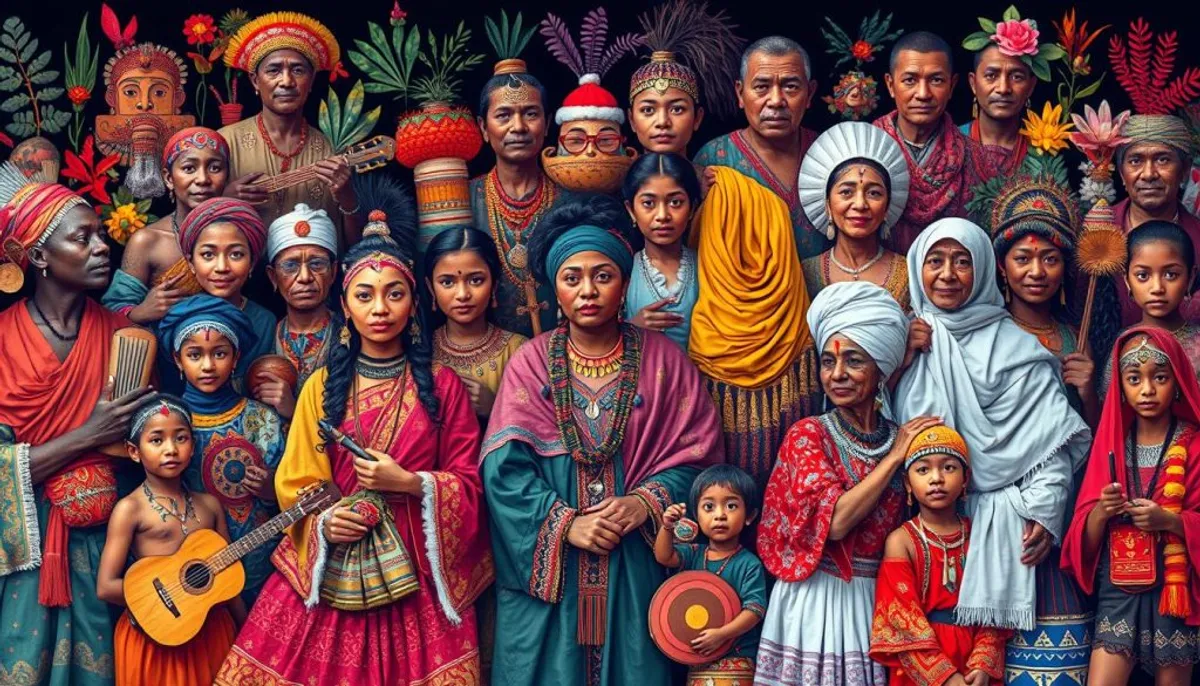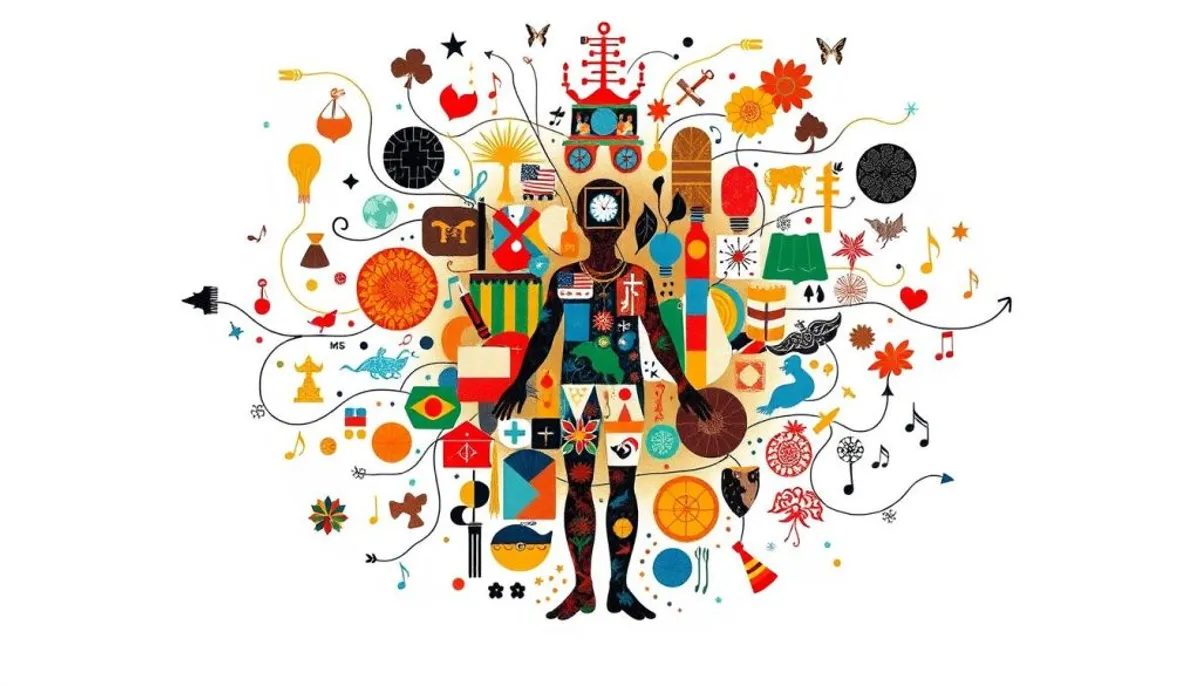The culture shapes our identity and guides our human development. It plays a crucial role in society, influencing our behaviors and values. Cultural influence manifests in all aspects of our lives, from our social interactions to our worldview.
Human development is deeply rooted in our cultural heritage. Our traditions, customs, and beliefs form the foundation of our identity. This cultural transmission ensures continuity between generations while allowing the evolution of our practices.

The impact of culture on man is reflected in our daily choices. It influences the way we think, act, and communicate. Cultural diversity enriches our society, offering new perspectives and fostering innovation.
In summary, culture is the driving force behind our social and individual evolution. It allows us to adapt, create, and thrive in a constantly changing world. Understanding its influence is essential for navigating the complexities of our modern society.
The fundamental role of culture in human development
Culture is essential for the development of humanity. It shapes our cultural identity and profoundly influences our social behavior. Cultural heritage, passed down from generation to generation, forms the foundation of our personality.
Cultural heritage as the foundation of identity
Cultural heritage is the cornerstone of our identity. It encompasses the traditions, customs, and values that define us. A recent study reveals that 78% of the French see their cultural heritage as essential to their sense of belonging.
The transmission of values and knowledge
The transmission of values is a continuous process, carried out through education and social interactions. Statistics indicate that 85% of primary and secondary schools in France have a library. This facilitates access to culture from a young age.
The influence on social behavior
Culture shapes our social behavior in multiple ways. It defines social norms, guides our interactions, and influences our emotional expressions. A study reveals that 72% of the French believe that their culture has a significant impact on how they interact with others.
| Cultural Aspect | Impact on Behavior | Percentage of Influence |
|---|---|---|
| Social Norms | Defines acceptable behaviors | 85% |
| Ethnic Identity | Guides consumption choices | 70% |
| Beliefs | Impacts decisions and judgments | 78% |
| Social Learning | Affects temperament and attitudes | 82% |
What is the impact of culture on man
Culture profoundly shapes our personality and worldview. It influences our daily practices and how we interact with others. This complex phenomenon deserves in-depth analysis to understand its impact on the individual and society.
The evolution of cultural practices
Cultural practices are constantly evolving, reflecting social and technological changes. This evolution affects how we communicate, work, and entertain ourselves. For example, the rise of social media has transformed our social interactions and our relationship with information.
The effects on individual personality
Culture plays a crucial role in shaping our personality. It influences our values, beliefs, and behaviors. According to Sartre, we define ourselves by our choices, suggesting that our nature is not predetermined but shaped by our cultural environment.
| Aspect of Personality | Cultural Influence |
|---|---|
| Moral Values | Passed down through education and social norms |
| Social Behaviors | Modeled by traditions and customs |
| Personal Aspirations | Influenced by cultural ideals of success |
The importance in identity construction
Culture is essential in identity construction. It allows us to position ourselves within a social and historical context. As Aristotle points out, our innate abilities develop through our cultural environment, shaping our unique identity.

The impact of culture on man is undeniable. It guides our personal evolution, influences our personality, and contributes to the construction of our identity. Understanding these mechanisms helps us better appreciate human diversity and the importance of mutual respect in our multicultural societies.
Culture as a vector for social transformation
Culture is a fundamental pillar in the transformation of our society. In the face of economic challenges, the cultural sector, much like the Byzantine Empire did in the past, proves to be a lever for change. It provides jobs, generates income, and develops crucial skills for sustainable local growth.
Cultural innovation proves to be a powerful tool for social cohesion. It promotes the inclusion of all, regardless of age, gender, disability, origin, or economic status. This inclusive approach is vital for achieving the United Nations 2030 Agenda goals. It highlights the importance of solidarity among peoples and future generations.
However, challenges remain. The precariousness of cultural professionals and the underrepresentation of women in leadership positions are issues to be addressed. For true social transformation, it is essential to combat all forms of discrimination in the cultural sector, notably through an intercultural critique that allows for a deeper analysis and understanding of these issues.
Training and awareness efforts are beginning to bear fruit. They strengthen the role of culture as a catalyst for social inclusion. Access to and participation in cultural life improve the well-being of populations. They foster a sense of belonging and shared identity.
By involving local communities and stimulating cultural diversity, the cultural sector positions itself as an essential vector for social transformation. It proposes innovative solutions to current societal challenges, promoting sustainable and inclusive change, particularly by fostering social inclusion.
The interaction between nature and culture in human development
The nature vs culture debate is at the heart of our understanding of human evolution. This complex interaction shapes our natural behaviors and influences our development.
The nature-culture debate
The distinction between the innate and the acquired raises questions about what defines our essence. The ancient Greeks used the term “phúsis” to describe the development process, encompassing birth and growth. This view emphasizes the importance of biological heritage and social heritage in forming our identity.
The cultural influence on natural behaviors
Cultural influences modify our so-called “natural” behaviors. Hippocrates already observed that the environment and customs shaped the morphology and character of populations. The example of the Macrocéphales illustrates how cultural practices can alter human physiology over time.

The modification of biological practices by culture
Culture transforms our nature, allowing adaptation to various environments. This interaction between biology and society is at the heart of human diversity. Education and social conditioning play a crucial role in this process, highlighting our capacity to learn and adapt rather than being innately programmed.
| Aspect | Influence of Nature | Influence of Culture |
|---|---|---|
| Morphology | Genetic inheritance | Cultural practices (e.g., Macrocéphales) |
| Behavior | Basic instincts | Social norms and education |
| Development | Biological predispositions | Experiences and social environment |
The challenges of cultural diversity in modern society
Cultural diversity raises profound challenges for our contemporary society. It enriches our communities while posing complex questions. Multiculturalism, cultural identities, and interculturality are at the center of debates.
Multiculturalism and its challenges
Multiculturalism aims to value the coexistence of different cultures. In 1988, Canada was the first country to adopt a multicultural law. This approach recognizes diversity as a strength but raises questions about integration and social cohesion.
The preservation of cultural identities
Preserving cultural identities is essential in a globalized world. UNESCO has emphasized the importance of cultural pluralism to stimulate public life. This involves protecting the unique languages, traditions, and heritages of each group.
Interculturality as a social wealth
Interculturality promotes exchanges between diverse cultures. It creates opportunities for innovation and mutual enrichment. For example, initiatives like those of the Croatian Red Cross have used art to promote understanding between different ethnic groups.
The modern society must find a balance between unity and diversity. The United Nations 2030 Sustainable Development Agenda integrates culture transversally, linking education, tourism, and development. This approach recognizes that cultural diversity is essential for building a sustainable and inclusive future.
Conclusion
The cultural impact on human development is undeniable. Culture shapes our identity, values, and worldview. It plays a crucial role in our evolution, influencing our behaviors and social interactions. Statistics show the importance of cultural activities in France, with 63.1 million entries to museums and heritage sites in 2019.
Cultural diversity is a wealth for our society. It allows us to enrich each other and build a stronger social cohesion. Platforms like Diptick facilitate access to this diversity, allowing visitors to easily discover new cultural experiences. This accessibility contributes to the promotion and preservation of our cultural heritage.
The future of our society depends on our ability to value and integrate this cultural diversity. By understanding the impact of culture on man, we can build more inclusive and innovative societies. It is by cultivating this wealth that we will be able to meet future challenges while preserving our unique cultural heritage.
RelatedRelated articles


